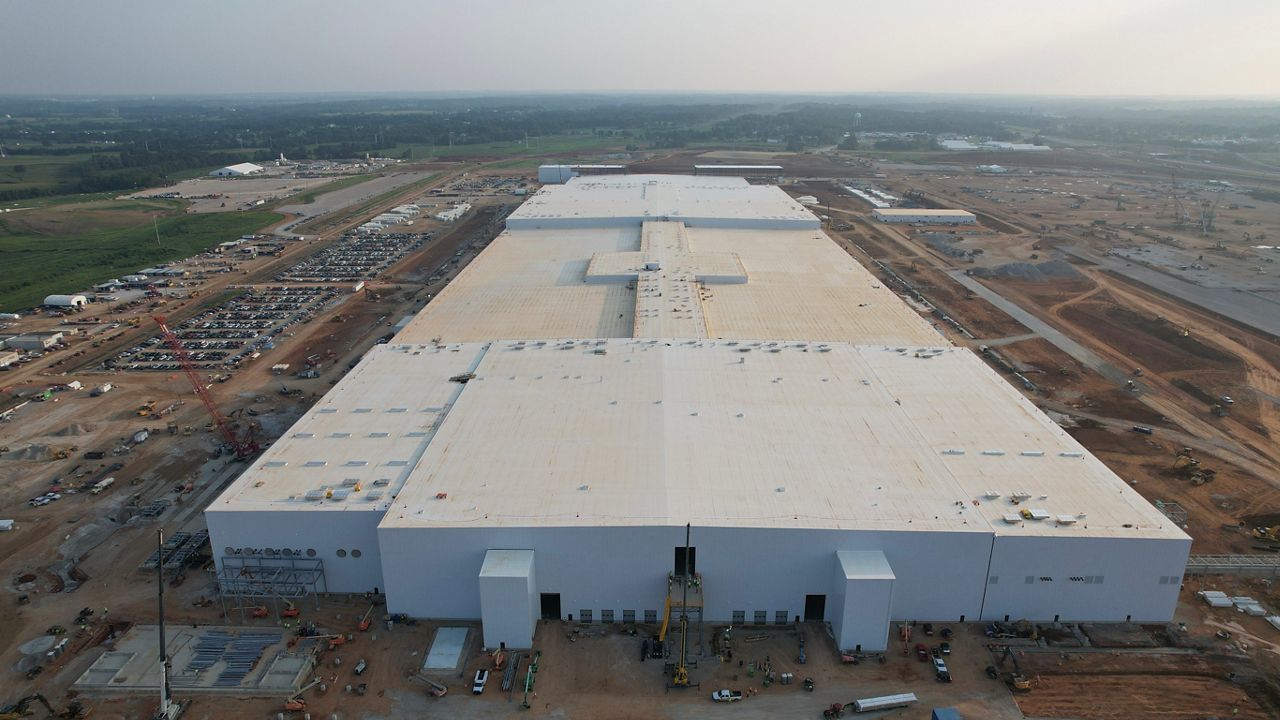GLENDALE, Ky. — The Blue Oval SK battery plants being built in Hardin County are on track to start production in 2025.
The twin battery plants have been touted for the economic boost they’ll bring to the Bluegrass State, creating nearly 11,000 new jobs.
But before EV batteries, the area has long been known for its success in a different industry: agriculture.
In Glendale, Houston Howlett’s family has been farming for generations, and he’s concerned about what lies ahead.
Howlett was born and raised in Glendale, and after moving away for several years, he came back and planted his own permanent roots in the rural community. He and his wife built their dream home recently.
“We knew there was an industrial site there when we built the house, but it had been sitting there for 20 years,” Howlett said. “You can’t make decisions based off of what might happen, so we decided to build our home. And unfortunately, the timing was terrible, because the same time we built our home, they decided to put a $6 billion battery plant in our front yard.”
Howlett is not concerned about his livelihood. He farms about 1,500 acres of land all around the area where the plants are being built.
“This is some of the best farmland in the region right here where we’re at,” he said, explaining that’s partly because of the good Crider soil in the area, and partly because the land has long been managed and cultivated by farmers.
As a kid growing up in a farming family, Howlett grew and sold his own sweet corn in the summers, making enough money to pay for college. He studied agricultural economics at the University of Kentucky and worked for another farming operation until he could slowly build up his own, producing corn and soybean.
“It’s been difficult getting established in the first place,” Howlett said. “It’s not something that happens very often for someone to start a farming operation from the ground up.”
His dream was to eventually buy the family farm and carry it on, but now, that dream feels uncertain.

Howlett says it takes a long time to get to that point, explaining, “I don’t have the capital to own land, so generally most farmland that’s farmed is owned by landowners.”
Farmers like Howlett lease plots of land all over the area to grow their crops. He worries the landowners he works with might sell their property off for industrial use, with land value expected to skyrocket because of the twin battery plants.
“These are relationships that are built over a long time and a lot of trust that’s involved with farming this land,” he said. “And it’s not something that you just pick up and go do and move into another town and decide you’re going to go start leasing land and start farming.”
Howlett and other farmers in the area say they had no chance to give input or be part of the planning early on. He says he requested a meeting with the Army Corps of Engineers, but it was denied. He’s concerned about environmental factors like plant fire risks and potential chemical spills.
“The fact of the matter is they brought this liability on the community without any type of discussion from the community on whether we wanted to accept that liability,” he said.
Howlett also worries about the plants’ watershed. Showing where it runs off, he said, “This drain will take all the water from the site and push it down the Nolin River, which feeds the Hardin County Water District 2.”
Howlett understands what the Blue Oval SK plants mean for the state’s economy, saying, “Agriculture could never compete economically with a $6 billion investment in the county, absolutely not.”
But he wants government officials and business leaders to understand what’s also at stake.
“When you see land that’s been managed for generations to get to where it is now being bulldozed under, it’s more than just a piece of dirt to a farmer,” he explained. “[The farmland is] more than just a place to pour a concrete slab. It takes more than most people realize to feed the world, to feed the country.”
Howlett says he’s had contact with Ford and BlueOval SK’s PR teams and asks questions, but he’s often not satisfied with the vague answers handed down by the company’s legal team.
In a statement, BlueOval SK external Affairs Director Ursula Madden said:
“We understand a new manufacturing facility of this size comes with change. BlueOval SK has incorporated facility design features such as no underground storage tanks coupled with containment structures and sealed flooring with dedicated drainage to wastewater collection and treatment to help ensure the chemistry used in manufacturing does not have contact with water runoff or soils. Fire protection systems have been designed to meet or exceed code requirements. BlueOval SK follows strict federal regulations to ensure our facilities are safe for employees and the surrounding communities.”



